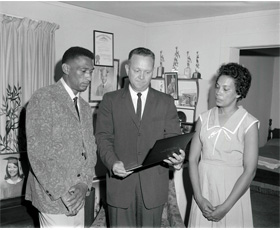On April 24, members of t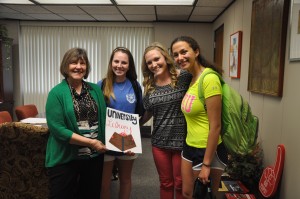 he Omega Phi Alpha National Service Sorority surprised Dean Connie Foster with a handmade thank you card. The Rho Chapter at WKU was founded in 1993 and is dedicated to serving the world around us, developing leadership skills, and building lifelong friendships. It was significant that a campus service group was honoring the Libraries for all that the Libraries offers the students. More than twenty members signed the card, and the three ladies who gave it to the Dean were gracious as they thanked Dean Foster and her faculty, students, and staff for their service to the university.
he Omega Phi Alpha National Service Sorority surprised Dean Connie Foster with a handmade thank you card. The Rho Chapter at WKU was founded in 1993 and is dedicated to serving the world around us, developing leadership skills, and building lifelong friendships. It was significant that a campus service group was honoring the Libraries for all that the Libraries offers the students. More than twenty members signed the card, and the three ladies who gave it to the Dean were gracious as they thanked Dean Foster and her faculty, students, and staff for their service to the university.
Thank you card presented to WKU Libraries
Comments Off on Thank you card presented to WKU Libraries
Filed under Events, Latest News, Uncategorized
WKU celebrates 80 years as Federal Depository Library
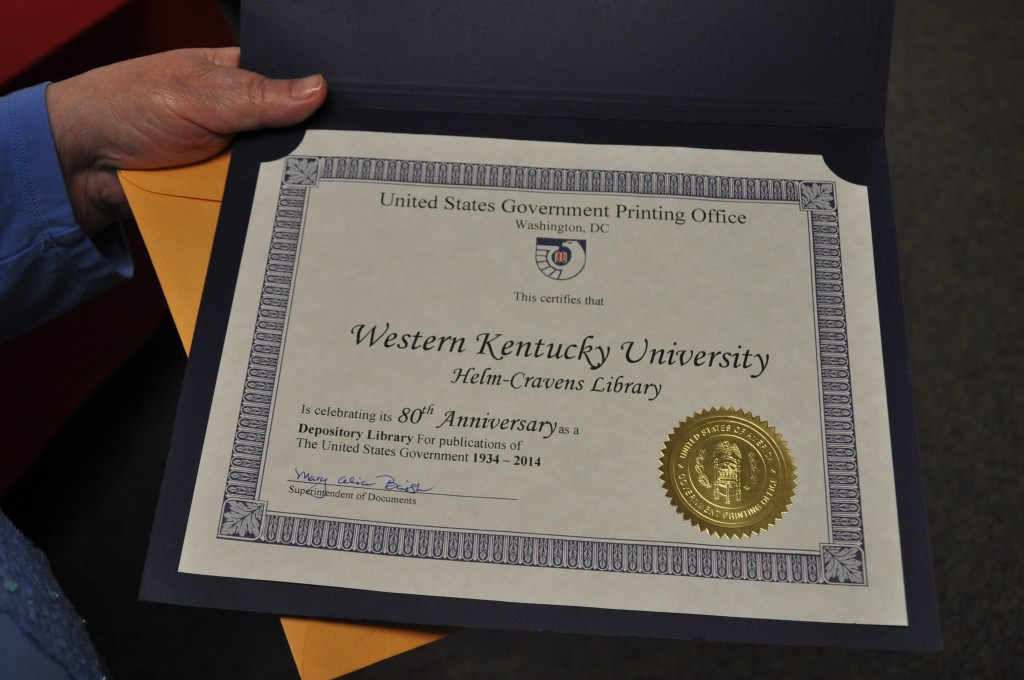 WKU Libraries celebrates its 80th anniversary as a United States Federal Depository Library this year. “Your long-term commitment to making Federal Government information available to the public is greatly appreciated,” said Mary Alice Baishe, Superintendent of Documents for the U.S. Government Printing Office. “Your partnership with the U.S. Government Printing Office helps accomplish a Government mission as well as meet your constituent service objectives. We look forward to working with you (WKU Libraries) and your staff for years to come as we all strive to provide the American public with free, easily accessible Government information.” WKU Libraries has been a designated Federal Depository Library since 1934. Go to http://wku.edu/library/dlps/gov_law/index.php for more information on the program.
WKU Libraries celebrates its 80th anniversary as a United States Federal Depository Library this year. “Your long-term commitment to making Federal Government information available to the public is greatly appreciated,” said Mary Alice Baishe, Superintendent of Documents for the U.S. Government Printing Office. “Your partnership with the U.S. Government Printing Office helps accomplish a Government mission as well as meet your constituent service objectives. We look forward to working with you (WKU Libraries) and your staff for years to come as we all strive to provide the American public with free, easily accessible Government information.” WKU Libraries has been a designated Federal Depository Library since 1934. Go to http://wku.edu/library/dlps/gov_law/index.php for more information on the program.
Comments Off on WKU celebrates 80 years as Federal Depository Library
Filed under Events, General, Government Documents, Latest News
A Shaker Woodstock?
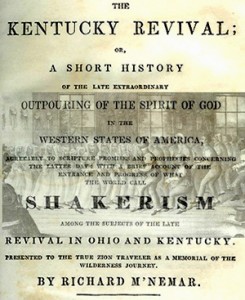 In an April, 1848 letter to his nephew Robert in Marshall, Illinois, Woodford Dulaney discussed the family fortunes, both economic and personal. Writing from Cloud Spring Farm in Warren County, Kentucky, Dulaney had advice for Robert, who was overseeing some business interests in Illinois. He gave him instructions regarding the renewal of a store lease to one Greenough (“do so in black and white and bind him up close and have an eye to his neglect . . . for certainly he does not take any care of the property”). He also sympathized with Robert’s travails over the settlement of an estate (“I am in hopes if you have to resort to the law, you may have justice”). Dulaney reported that family health was mixed: “Your Aunt Nelly can’t stand it much longer has a very bad cold & cough,” but Robert’s 3-year-old cousin and namesake, Robert Fenton Dulaney, was “a bouncing boy & is cock of the walk.” Dulaney then cast an analytical eye on the local economy: “The merchants in Bowling Green are bringing on very heavy stocks of goods & selling them very low.” This was too tempting for the farmers, he worried, “for when goods are low they buy extravagantly.”
In an April, 1848 letter to his nephew Robert in Marshall, Illinois, Woodford Dulaney discussed the family fortunes, both economic and personal. Writing from Cloud Spring Farm in Warren County, Kentucky, Dulaney had advice for Robert, who was overseeing some business interests in Illinois. He gave him instructions regarding the renewal of a store lease to one Greenough (“do so in black and white and bind him up close and have an eye to his neglect . . . for certainly he does not take any care of the property”). He also sympathized with Robert’s travails over the settlement of an estate (“I am in hopes if you have to resort to the law, you may have justice”). Dulaney reported that family health was mixed: “Your Aunt Nelly can’t stand it much longer has a very bad cold & cough,” but Robert’s 3-year-old cousin and namesake, Robert Fenton Dulaney, was “a bouncing boy & is cock of the walk.” Dulaney then cast an analytical eye on the local economy: “The merchants in Bowling Green are bringing on very heavy stocks of goods & selling them very low.” This was too tempting for the farmers, he worried, “for when goods are low they buy extravagantly.”
But Dulaney also had religious news, in particular of some recent activity in the local Shaker community. The 1840s was a decade of national revival, and in Shakerism it manifested itself in the dedication of a plot of ground where members assembled in the spring and fall, according to historian Julia Neal, to “commune with the voice and receive the great outpouring of the spiritual.” From what Dulaney had heard, however, this gathering promised to be unusual both in its size and public nature: a veritable 19th-century Woodstock, with the Shakers’ unique demonstration of devotion, their rhythmic marching and ecstatic dancing, much in evidence. “[T]he Shakers have commenced worship again they jump higher & quicker than ever,” Dulaney told Robert, “and on Monday the 1st day [of] May they are going to worship out in a grove”–a 10-acre tract, no less, which they had cleared in order to give themselves “a far sweep.” Likening the worshipers to frolicking creatures of the field, Dulaney declared “I intend to go and see them cut capers.”
Woodford Dulaney’s letter is only one of many sources on the Kentucky Shakers in the Manuscripts & Folklife Archives holdings of WKU’s Special Collections Library. Click here to access a finding aid. For more collections about the Shakers and other religious faiths, search TopSCHOLAR and KenCat.
Comments Off on A Shaker Woodstock?
Filed under Manuscripts & Folklife Archives
SOKY Book Fest attracts hundreds of eager readers and writers
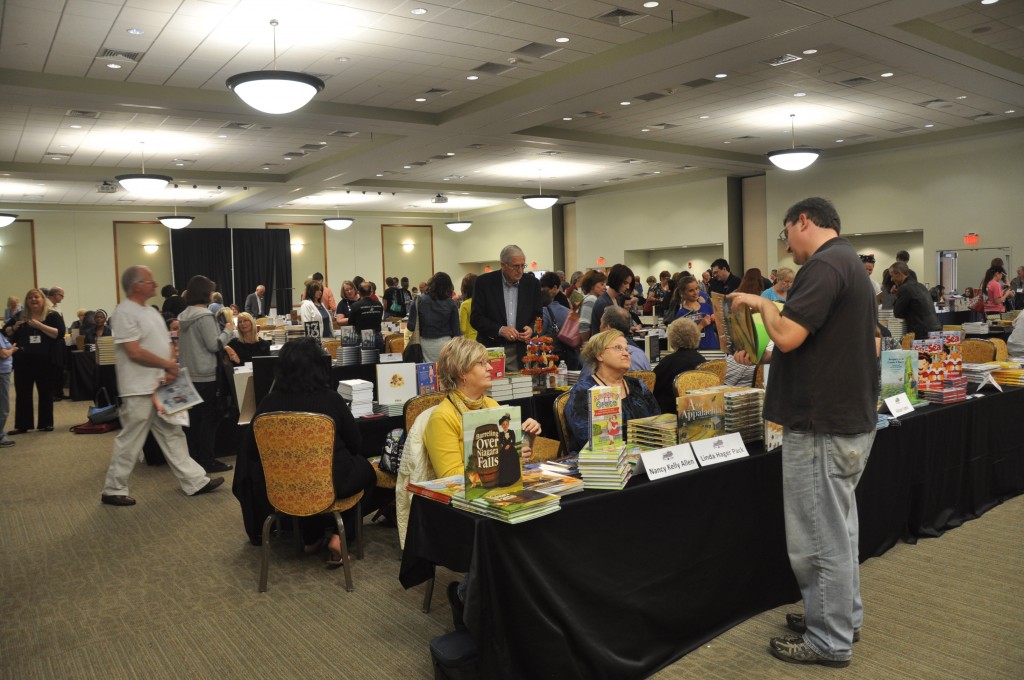 More than 140 authors charmed thousands of eager readers—young and old—at the 2014 Southern Kentucky Book Fest on Friday, April 25 and Saturday, April 26. On Friday, the Children’s Day event brought in over 800 students, and the Kentucky Writers Conference had record-breaking numbers. Both were held at the Knicely Conference Center. On Saturday, bestselling author Charlaine Harris, well-known for her Sookie Stackhouse series which was the inspiration for the HBO series True Blood, filled a room of Sookie fans.
More than 140 authors charmed thousands of eager readers—young and old—at the 2014 Southern Kentucky Book Fest on Friday, April 25 and Saturday, April 26. On Friday, the Children’s Day event brought in over 800 students, and the Kentucky Writers Conference had record-breaking numbers. Both were held at the Knicely Conference Center. On Saturday, bestselling author Charlaine Harris, well-known for her Sookie Stackhouse series which was the inspiration for the HBO series True Blood, filled a room of Sookie fans.
Book Fest volunteer Amy Hardin has been attending for years. “I love that you can interact with your favorite authors, sit in on entertaining panels, and be introduced to new authors–all in one weekend! Our community is blessed beyond measure to have such a world class event in its own back yard year after year,” said Hardin.
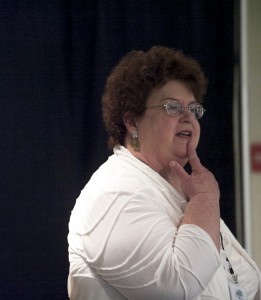 “When I saw Charlaine Harris was headlining Book Fest, I about fell out of my chair,” said Corie Martin, Manager of WKU Creative Web Services. “She is one of my favorites and I’ve been trying to get to one of her signings for years.”
“When I saw Charlaine Harris was headlining Book Fest, I about fell out of my chair,” said Corie Martin, Manager of WKU Creative Web Services. “She is one of my favorites and I’ve been trying to get to one of her signings for years.”
In addition to the long line of urban fantasy enthusiasts eagerly waiting for Ms. Harris to sign their books, scores of people attended panel discussions and presentations from as far away as Michigan, Georgia, and South Carolina, and thousands visited the author signing area throughout the day.
When asked what she looks for when inviting authors to Book Fest, Kristie Lowry, Literary Outreach Coordinator for WKU Libraries and Book Fest organizer, says variety is key. “We want to bring an eclectic mixture of genres to meet the needs of all the different readers out there,” said Lowry. “We always welcome suggestions, and I am willingcontact the big name authors that might not venture to book festivals much anymore. You never know when Stephen King will decide that we are his one event for that year.”
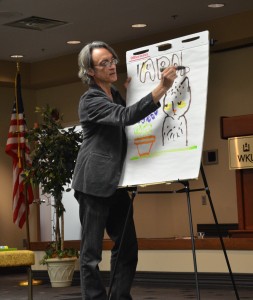
Children’s Day featured author and illustrator Chris Raschka along with more than thirty other children’s and young adult authors. In conjunction with Children’s Day, the Kentucky Writers Conference (KWC) offered free writing workshops presented by Book Fest authors who came in a day early to teach a wide range of classes.
According to Lowry, numbers at the Writers Conference were the highest ever with more than 225 people in attendance. “This was the first year for an online registration process. We were so glad we had a count on each presentation as many of the classes filled up early,” said Lowry. “Filling your seats is always a great problem to have; the registration allowed us to better accommodate the larger group sizes.”
To see highlights and pictures from the weekend, go to sokybookfest.org or wku.edu/library.
Comments Off on SOKY Book Fest attracts hundreds of eager readers and writers
Filed under Events, Flickr Photos, New Stuff, Uncategorized
Bethie
Elizabeth Moseley Woods was born in Mississippi in the last months of the Civil War. When she was six, her family moved to Glasgow, Kentucky and, when she was sixteen, to Bowling Green. By the time she joined the WKU faculty in 1911 to teach modern languages, Elizabeth had traveled around the world and studied in England, France and Italy. She retired from teaching in 1937, but spent the next decade applying her passion for gardening and landscaping to beautification of the WKU campus.
To her younger sister Martha (Woods) Potter, however, Elizabeth Woods was just “Bethie,” and it is from Martha that we get an affectionate and intimate glimpse of this longtime WKU faculty member.
Bethie’s absent-mindedness caused particular mirth. Standing with Bethie in her living room one day in 1933, Martha noticed that “her pink panties were around her feet where they had dropped down and she never had noticed them. It would not have been so funny if it had been anybody but Bethie,” she wrote her children. Several years later, Martha reported that “Bethie distinguished herself by parading around the streets of Bowling Green with a strap to her panties hanging down between her legs almost to the ground.” Bethie explained that “the panties were the old fashioned kind with strap (a concession to what we used to call ‘open drawers’). . . . I went into stitches,” laughed Martha. “I told her I hoped that nobody took her for me.”
Bethie could be both clinical and sentimental in her opinions. After a 1934 visit to a venerable Bowling Green senior citizen, “Bethie said never again,” reported Martha. “She thought that old lady belonged under the ground.” Bethie was no more enamored of humanity’s other half. “She is a hard boiled man hater,” concluded her sister. Nevertheless, Bethie mourned the death of WKU president Henry Hardin Cherry in 1937, saying “no one ever knew what a good friend he had been to her.” She also liked Virginia Garrett, the wife of Cherry’s successor, because of their shared love of flowers. And when Bethie arrived at a friend’s house for lunch and realized that the friend had forgotten about the engagement, she “hot footed it down the alley,” said Martha, to spare the woman embarrassment.
Both Martha and Bethie were beset by failing eyesight in their later years, but reacted quite differently. “I know that Bethie can’t see as she should but she never admits it. All old people get that way,” said 82-year-old Martha of her 86-year-old sibling. After learning that, during dinner in a poorly lit room, Bethie had put down her fork and been unable to find it again, “I told her she should have just asked,” Martha wrote, “but she isn’t that way.”
Perhaps it was her willingness to let her older sister be herself that allowed Martha to coexist peacefully with Bethie until Martha’s death in 1963 at age 94. But hers was an early death, relatively speaking, for Bethie lived until 1967, reaching the age of 102.
Martha Potter’s letters about her sister Bethie are part of the Lissauer Collection in the Manuscripts & Folklife Archives holdings of WKU’s Special Collections Library. For more collections about Elizabeth Woods, the Potters and other Bowling Green families, search TopSCHOLAR and KenCat.
Comments Off on Bethie
Filed under Manuscripts & Folklife Archives
Student Appreciation Day
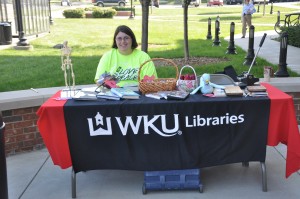 WKU Libraries’ Educational Resources Center faculty, staff, and student workers participated in Student Appreciation Day at the College of Education and Behavioral Sciences on Wednesday, May 7. A steady flow of students visited the tables in front of Gary A. Ransdell Hall. In addition to samples of ERC materials that can be checked out, the Libraries table offered “Read” bracelets, candy, and a chance to win t-shirts, red towels, and book lights. Students also enjoyed using the Ellison Die Cuts to make bookmarks.
WKU Libraries’ Educational Resources Center faculty, staff, and student workers participated in Student Appreciation Day at the College of Education and Behavioral Sciences on Wednesday, May 7. A steady flow of students visited the tables in front of Gary A. Ransdell Hall. In addition to samples of ERC materials that can be checked out, the Libraries table offered “Read” bracelets, candy, and a chance to win t-shirts, red towels, and book lights. Students also enjoyed using the Ellison Die Cuts to make bookmarks.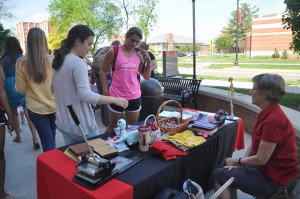
Paganelli offers Music Makerspace to Elementary Ed students
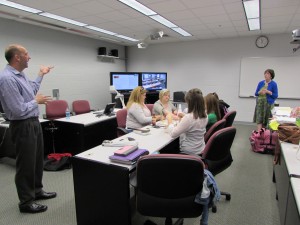
On May 1, WKU Libraries Assistant Professor Anthony Paganelli presented “Future Music Makerspace” for an Elementary Education Course at Elizabethtown.
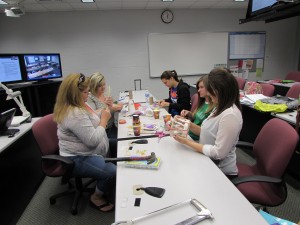
The makerspace was a new concept to the students who enjoyed the presentation and were impressed with the possibilities of implementing the educational tool in their curriculum.
Comments Off on Paganelli offers Music Makerspace to Elementary Ed students
Filed under Uncategorized
Preservation workshop proves successful
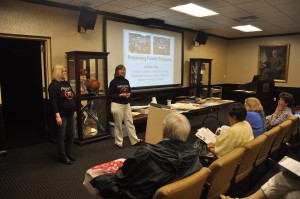 Special Collections Librarians Nancy Richey and Allison Day offered a workshop “Fading Away: Preserving Your Treasures” to the community Monday, April 28 from 5-7 pm.
Special Collections Librarians Nancy Richey and Allison Day offered a workshop “Fading Away: Preserving Your Treasures” to the community Monday, April 28 from 5-7 pm.
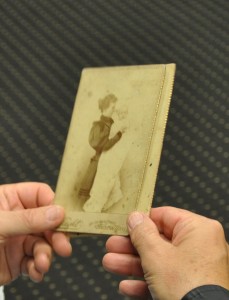
Several people braved the storms to hear how to protect old photographs and paper-based materials. Richey and Day offered helpful tips on how to preserve, store, and restore damaged items.
Comments Off on Preservation workshop proves successful
Filed under Flickr Photos, New Stuff
Of Equity, Whiskey Stills, and Safety Pins
 On April 10, 1849, American inventor Walter Hunt received a patent for that friend of babies everywhere, the safety pin. Almost 40 years earlier, one Edward Richardson approached Warren County distiller Thomas Middleton with an equally ingenious invention: a design for a “super still,” one that could substantially increase his daily production of spirituous liquor. Richardson, who had obtained a patent for the design, offered not only to sell Middleton the right to use it in Warren County, but to introduce him to a local man ready to buy a sublicense. Middleton agreed. He signed a note for $50 (about $750 today), received a document purporting to transfer the patent rights, then waited for Richardson to come to his home, give him the plans, and help him set up the new system.
On April 10, 1849, American inventor Walter Hunt received a patent for that friend of babies everywhere, the safety pin. Almost 40 years earlier, one Edward Richardson approached Warren County distiller Thomas Middleton with an equally ingenious invention: a design for a “super still,” one that could substantially increase his daily production of spirituous liquor. Richardson, who had obtained a patent for the design, offered not only to sell Middleton the right to use it in Warren County, but to introduce him to a local man ready to buy a sublicense. Middleton agreed. He signed a note for $50 (about $750 today), received a document purporting to transfer the patent rights, then waited for Richardson to come to his home, give him the plans, and help him set up the new system.
Alas, the whole thing was a fraud: no set-up tutorial, no sublicensee waiting in the wings–and, Middleton concluded, no new and improved still, just a “cheat and artifice to make money.” To add insult to injury, Richardson successfully sued Middleton for non-payment of his $50 note. A debt’s a debt, caveat emptor and all that, the court declared, having no discretion to look beneath the surface for extenuating circumstances.
In his appeal to the Warren County Equity Court, Middleton’s plea was simple: Duh. Of course he hadn’t paid, but this court should exercise its power to take the fraud into account: it should grant him relief from an unconscionable common law judgment by voiding the transaction, thus preventing Richardson from collecting the debt.
After the merger of common law and equity courts into “common pleas” courts (among other names), complainants like Middleton no longer needed to resort to separate legal proceedings. For those taken in by crackpot inventions, equity was, and remains, the safety pin of jurisprudence, holding the fabric of civilization together by deflecting the sharp jab of the common law.
Thomas Middleton’s complaint is one of hundreds of 19th-century Warren County, Kentucky equity court cases in the Manuscripts & Folklife Archives holdings of WKU’s Special Collections Library. Click here to access a finding aid. For other collections, search TopSCHOLAR and KenCat.
Comments Off on Of Equity, Whiskey Stills, and Safety Pins
Filed under Manuscripts & Folklife Archives
April Out of the Box
Bill 85-10-F Changing Intersection
Presidential Search Committee, 1997
Preston Health & Activities Center
Unidentified Photos – just say yes
Comments Off on April Out of the Box
Filed under University Archives


